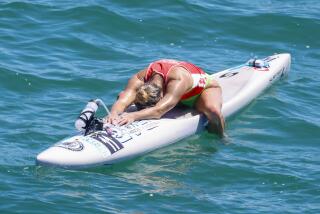In California, Newport Beach’s Imua Club Has Ruled the Waves for the Past 15 Years
- Share via
Dennis Campbell, founder and coach of Newport Beach’s Imua Outrigger Club, doesn’t mind when people make the inevitable comparison between his team and a certain proud and poised National Football League club.
“We like being thought of as the bad guys,” he said. “We like it when people say we’re like the Oakland Raiders.”
Ah, well, old habits are difficult to break.
One habit Imua has been happy to hold onto for the last 15 years is winning--big and often. Since Campbell started the club in 1970--choosing as a name the Hawaiian expression for Charge!-- the Imua men’s team has won practically every race run by the Kalifornia Outrigger Assn. (KOA).
Imua paddlers have won the U.S. title six times, have defeated teams from Tahiti and Hawaii, teams steeped in paddling tradition, and will be the team to beat in this weekend’s 31-mile paddle from Newport Beach to Catalina Island and back. Women will paddle to Catalina on Saturday, then men will paddle back on Sunday.
But winning as often and by as large a margin as Imua does, has led to some ill feeling among other clubs. Imua has been called snobbish and selfish. Campbell has heard the criticism for some time.
“There are always going to be detractors when someone is succeeding consistently,” he said.
Leslie Davis, former KOA president, has a different view. “Their attitude is, ‘All for Imua,’ ” she said. “Every team in the (13-member) association is required to have a race. Their (Imua’s) races are usually not up to par. They don’t really care about the association, just winning.”
Davis explained that Imua tends to concentrate solely on the racing itself, rather than also paying attention to the social atmosphere--luaus and such--surrounding the event.
Derek Harrison, Imua member and former KOA race chairman, said that in 1976 and 1977 there was a movement to disqualify the club from competition. At the time, Harrison was the coach of the Long Beach Outrigger Club. The movement centered on Imua’s refusal to participate in sprint regattas.
Since Harrison joined the club three years ago, Imua has participated more often in regattas. This season, in fact, Imua won the 3,000-meter title at the World Sprint Championships in Long Beach.
“KOA wants and needs everyone to show for their races,” said Dave Dearth, Imua alternate and KOA race chairman.
Campbell, however, considers his team to be distance oriented. He said he and his team derive little pleasure from winning sprint regattas. They prefer races of 20 miles or more.
“I really don’t get too excited about an eight-minute race,” Campbell said. “I’ve been racing 21 years. Those short courses are important to new people coming into the sport, but we’ve got an older team, a lot of us have families. We’d rather spend those four weekends with them than race in regattas we don’t want to be at. I’d rather prepare for the big races.”
Davis said that the age range for most California teams is 25 to 28. Most Imua members are in their late 30s. In addition to Campbell, there are three others, Tim Rush, Dick DeBhard and Clint Reynolds, who were on the original team.
Campbell, who had been racing for six years, wanted to start his own club. He said he simply walked into Blackie’s Bar in Newport Beach and asked: “Hey, who wants to go outrigger paddling?”
It worked. He got the core of his team from the bar, and word of mouth soon had Campbell conducting tryouts.
Today, the team boasts former Olympic rower Per Hertig of Sweden, Rush, who pitched in the Houston Astros’ organization, and Bob Stafford, a former professional volleyball player. There are others who excelled in sports at community colleges and universities.
“These people were among the best at what they did,” Harrison said. “When they decide to change and get into paddling, they want to know who’s the best. When they ask around, the answer is usually the same. The best is Imua.”
Like the Raiders, Imua is not lacking in self-confidence.
“They are snobs,” Pattie Huggins, an Imua women’s team member, said. “I hate to admit it, because they’re very nice, but they know they’re going to win.”
A random sampling of statements made by club members:
--”A team may win a race, but if Imua isn’t there, what is it worth?”
--”We’ll do anything to win. Some people won’t make that commitment. It’s made them nervous about us.”
--”People get upset because they’ll paddle their tails off, and when they get to shore we’re loading our canoes on the trucks.”
--”Winners will always be called snobs.”
Quite simply, the men of Imua believe they will win any race they enter. They don’t understand why people get upset with that.
“We prepare better for a race than any other team,” Campbell said. “Winning isn’t as important as being properly prepared. We all have the same goals, same desires. I expect to win every time because we are prepared to win.”
Campbell is responsible for the preparation. A marathon runner, he uses runners’ interval-training techniques on his paddlers. He also has put a heavy tire on the hull of his outriggers to create more drag and more difficult workouts. He sometimes has members paddle for three straight hours.
But what makes Imua so successful, members say, is not strength but technique. Campbell teaches technique as if it were a religion.
“There are a lot of races that on paper we shouldn’t win,” Harrison said. “But we don’t race on paper. We’re not the strongest, but we have the best technique because of Dennis.”
Some outside the club have compared Campbell’s methods to those of Indiana University basketball Coach Bob Knight. Although no one has ever seen Campbell throw a chair, there is no mistaking who is in charge when the team is practicing. Large men carry out Campbell’s orders immediately.
When it comes time to put the canoes into the water, Campbell decides who will paddle with whom, and in which canoe.
Canoes are divided by skill. The best in No. 1, and so on. There rarely is griping about the assignments. When there is, the gripers are told that Imua will survive without them and they can leave whenever they choose.
“I think some of the criticism Imua receives is from people who maybe tried out for the team and didn’t get into as good a boat as they would have wanted,” Harrison said. “One thing I can guarantee is that however good you are, that’s the boat you’ll be in.
“But people come from other clubs, where they’ve been the best, and expect to race in our No. 1 boat. Well that’s very hard to do, because our No. 1 is the best. They quit and tell people that Imua is snobbish because it won’t let outsiders on.”
The cast of characters has changed in the canoes, but Campbell is the constant. Or at least he was. He has recently been devoting more time to his business of manufacturing surf skis. That has taken time away from the club, and Campbell is talking about hanging up his paddle.
“I’ve been doing this for 21 years,” he said. “It’s getting harder to devote as much time as I used to. Also I want to pursue my business.”
Which would be good news for some of Imua’s critics. Harrison, however, said nothing is definite and he doubts that Campbell could just quit paddling.
“I’ve seen people try to leave the sport cold-turkey,” he said. “But they can’t do it. It’s getting late in the season, so the older guys start thinking about quitting. Dennis is so much into the sport, I doubt he could just quit.”
Could Campbell just up and leave canoeing?
“Well, I’d probably still be involved,” he said. “I’d still probably be here for the big races.”
Al Davis would be proud.
More to Read
Go beyond the scoreboard
Get the latest on L.A.'s teams in the daily Sports Report newsletter.
You may occasionally receive promotional content from the Los Angeles Times.










